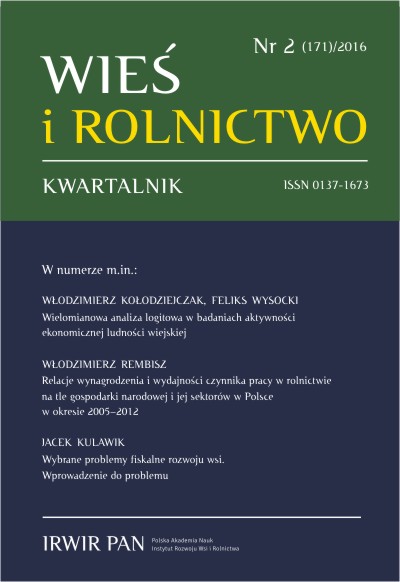Wielozmianowa analiza logitowa w badaniach aktywności ekonomicznej ludności wiejskiej
THE USE OF MULTINOMIAL LOGISTIC REGRESSION IN THE ANALYSIS OF RURAL POPULATION'S ECONOMIC ACTIVITY
Author(s): Włodzimierz Kołodziejczak, Feliks WysockiSubject(s): Social Sciences, Economy, Agriculture, Sociology, Economic development
Published by: Instytut Rozwoju Wsi i Rolnictwa Polskiej Akademii Nauk
Keywords: multinomial logistic regression; economic activity of population; labour market; flows on the labour market; rural population
Summary/Abstract: Multinomial logistic regression can be used to analyse economic activity of population and labour market. Its application enables to decompose labour resources according to selected demographic and socio-economic traits in relation to the degree of change in the state of economic population activity. The aim of the paper is to present the possibilities of using the logit models to assess the chances (risks) and probabilities of changes in the state of economic population activity depending on its selected socio-demographic traits. The flows from employment to unemployment, and to economic inactivity were discussed. The research method and the data were described. An interpretation of selected research results was also presented. Due to the need to follow changes of the state of economic population activity over time, individual raw data from the Labour Force Survey are relevant to build multinomial logit models of the labour market. The possibility of decomposition is limited by the size of the sample, which results from the structure of population under Labour Force Survey and from the length of the analysed period. In practice, a satisfactory model alignment requires a consideration of an analysis period which is at least several years long (and combining the data into a coherent base) along with an aggregation of certain population groups (e.g. all non-agricultural sections of PKD or contiguous age classes). Moreover, correct inference also requires knowledge and experience of a researcher and it should take account of a broad socio-economic context, i.e. quality conditions of the reference system.
Journal: Wieś i Rolnictwo
- Issue Year: 171/2016
- Issue No: 2
- Page Range: 11-39
- Page Count: 29
- Language: Polish

